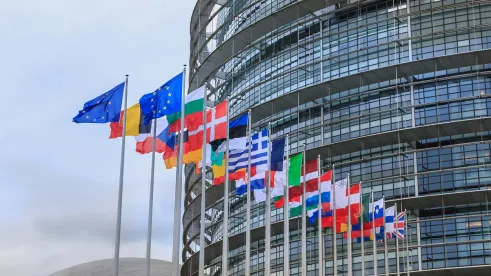The President of the United States (US) directed the American intelligence community to redouble efforts in ascertaining the origins of COVID-19, a move that comes amid US lawmakers increasingly pressing the Administration to investigate allegations of a possible leak from a laboratory in Wuhan in the People’s Republic of China (“China”). The European Union (EU) moved closer this week to implementing a COVID Digital Certificate for travel in the bloc, while the United Kingdom (UK) announced it would move forward with legislation to establish an Electronic Travel Authorisation for visitors without a visa or immigration status in Great Britain.
The UK also hosted the Group of Seven (G7) Trade Ministerial meeting this week to rally the world’s leading democracies to the cause of reforming the World Trade Organization (WTO), long a priority for the United States. US Secretary of the Treasury Janet Yellen will attend the G7 Finance Ministers meeting next week in London, England (4-5 June). Meanwhile, transatlantic partners collectively condemned the Lukashenko regime this week for diverting a European commercial aircraft and forcing it to land in Belarus. They also condemned the recent presidential elections in Syria. Looking ahead, EU and US leaders are set to meet on 15 June in Brussels, where meetings will likely focus on trade, technology and trade disputes, among other things.
In this issue, we also cover:
-
COVID-19 highlights among the transatlantic partners;
-
Notable UK, US, and EU developments; and
-
UK-EU trade deal
COVID-19 Highlights | EU, US, UK
On 26 May, members of the European Parliament’s Civil Liberties Committee endorsed the compromise deal to set up the COVID Digital Certificate in the EU, which aims to facilitate safe and free movement of people (EU and non-EU citizens) within the bloc, by providing proof of vaccination, proof of a negative test result or recovery from COVID-19. EU27 Ambassadors also endorsed the political agreement reached with the European Parliament on 20 May. Further to a final formal endorsement by the European Parliament and the Council expected in June, the Regulation shall be published in the Official Journal of the EU and would apply from 1 July. The European Council welcomed the political agreement on the EU Digital COVID Certificate and called for a rapid implementation. In addition, the European Council called for the revision of the Council Recommendation on travel within the EU by mid-June, and welcomed the revision of the Council Recommendation on non-essential travel into the EU.
In related news, on 25 May, the European Council agreed that Member States and the EU would accelerate vaccine sharing to support other countries, and they committed to donate at least 100 million doses by the end of the year. The European Council supports the leading role of COVAX, the global initiative to ensure equitable access to COVID-19 vaccines for low-and middle-income countries. The European Council conclusions reflected the EU is the largest exporter of COVID-19 vaccines and will continue “to increase global vaccine production in order to meet global needs”.
On 26 May, a court trial opened in Brussels with respect to a case brought by the EU against AstraZeneca for allegedly breaching its contractual obligations on delivery of COVID-19 vaccines to the EU. Among other things, the EU wants the pharmaceutical company to pay €10 per day for each vaccine delayed, starting July 1, if a Belgian court rules in the EU’s favor. Of the 300 million AstraZeneca doses expected by the end of June, only one-third was delivered to Member States. The company argues it has fully complied with the agreement, adding that vaccines are difficult to manufacture and it made its best effort to deliver vaccines on time.
On 26 May, US President Joe Biden announced that he had directed the US Intelligence Community to redouble efforts to collect and analyze information that could help the US Government reach a definitive conclusion on the origins of COVID-19, and to report back to him in 90 days. He added, “The United States will also keep working with like-minded partners around the world to press China to participate in a full, transparent, evidence-based international investigation and to provide access to all relevant data and evidence.”
Data from the Centers for Disease Control and Prevention (CDC) indicated last Sunday that 25 US states and Washington D.C. have fully vaccinated at least 50 percent of their adult population. CDC Director Rochelle Walensky said in congressional testimony on Wednesday that children should continue to wear masks, citing studies that demonstrate grade-school-age children can contract and spread the coronavirus without becoming sick, thereby serving as vectors. Other experts have challenged her assertion that children serve as vectors. By contrast, the United Kingdom, which has some of the highest vaccination rates in the world, said earlier this month that masks were no longer required for children in classrooms. Meanwhile, children under the age of 12 are not yet able to receive any of the approved COVID-19 vaccines in the United States.
This week, the US Department of State announced it would allow US citizens currently overseas who passports expired on or after 1 January 2020 to use their expired US passport for direct return travel to the United States until 31 December 2021. The Departments of State and Homeland Security acknowledged the difficulties and passport renewal appointment backlogs created by the global COVID-19 pandemic.
This week, the UK sent 260 ventilators and 2,000 pieces of personal protective equipment, along with health experts, to Nepal to help the country’s fight against COVID-19. Next week, the UK will host G7 health ministers at the Health Ministers Summit in Oxford.
Notable UK Developments
On 27-28 May, the UK hosted the G7 Trade Ministerial, where British International Trade Secretary Liz Truss urged her counterparts to support WTO reform, including a fully-functioning dispute settlement system, tackling unfair subsidies in industry and agriculture, modernising the WTO rulebook, and advancing digital and green trade. A summary of the meeting agenda and UK’s priorities is available here.
On 24 May, the UK launched a review of tariffs against the US in response to the ongoing steel and aluminium duties. The UK currently has measures in place on US products like whiskey, motorcycles and tobacco in response to the US metals tariffs. The consultation will run for six weeks and UK businesses, industry leaders and stakeholders can input online here.
On 25 May, Trade Secretary Truss launched a 14-week consultation to seek the views of the public and business with respect to a trade deal with India. The public consultation, which runs to 31 August, includes a questionnaire that will gather information from participants about their experiences and priorities when doing business with India.
Notable US Developments
In an interview with Reuters on Wednesday, US Trade Representative Ambassador Tai expressed optimism that the United States and Europe could settle a longstanding dispute over large civil aircraft subsidies. She stated, “We are giving it everything we’ve got. I also feel confident that that is being reciprocated across the table.” She suggested resolving this dispute would free the trading partners up to address other trade challenges, such as global market distortions or overcapacity issues.
On Wednesday, 26 May, the Office of the US Trade Representative (USTR) submitted a proposal to the WTO that urges Members to help address forced labor in the ongoing negotiations to curb subsidies to fishing activities, such as illegal, unreported, and unregulated (IUU) fishing. In a statement, Ambassador Tai said of the action, “The Biden-Harris Administration is committed to fighting forced labor wherever it occurs. We will continue to work closely with our partners and allies to promote a fair international trading system that addresses the sustainability of fisheries resources, and benefits workers and citizens around the world.”
Also on Wednesday, Deputy Secretary of State Wendy Sherman and European External Action Service Secretary General Stefano Sannino met in Brussels to reaffirm the strength of the U.S.-EU partnership on key foreign policy and security issues. They also noted the upcoming EU-US Summit set for 15 June, which many believe will be another step in revitalizing the transatlantic partnership. A readout of the meeting is available here.
On Thursday, 27 May, US Secretary of State Antony Blinken spoke with NATO Secretary General Jens Stoltenberg about next month’s NATO Summit, as well as NATO’s role in the transatlantic community and the world. Belgium will host the Summit on 14 June in Brussels.
On 23 May, US Senate Foreign Relations Committee Chairman Bob Menendez (D-New Jersey) issued a joint statement with counterparts in the Czech Republic, Latvia, Germany, Lithuania, Ireland, Poland, and the UK, condemning the Lukashenko regime in Belarus for forcefully diverting a Ryanair flight to “kidnap” journalist Raman Pratasevich. In sum, they called for the International Civil Aviation Organisation (ICAO) to investigate the incident, Belarus to be suspended from ICAO, and a ban imposed on all overflight of Belarus, including flights to and from the country. President Biden issued a statement condemning the flight diversion and journalist’s detention on 24 May.
Secretary Blinken spoke with German Foreign Minister Heiko Maas on 24 May. A readout reflected the discussions centered on events in Belarus, relief efforts in Gaza, and NATO. Secretary Blinken also reiterated US concerns about the Nord Stream 2 pipeline, despite waiving some sanctions last week related to a European company and its top officials involved in the project.
Last week, US Senator Kevin Cramer (R-North Dakota) announced he is leading the Protecting Our Well-being by Expanding Russian Sanctions (POWERS) Act, a bill that would build on bipartisan sanctions against Russia and reinstate sanctions the Biden Administration is waiving on entities and individuals involved in the construction of the Nord Stream 2 pipeline. With no Democratic support for the bill, it is believed the attempt to override the waivers will fail. Meanwhile, in an interview on 27 May, Senator Cramer argued the Administration’s waiver conflicts with the White House’s climate change priorities, noting, “[N]atural gas produced in Russia and shipped via pipeline to Europe – right into the heart of NATO by the way – has a 40% greater greenhouse gas emissions footprint than does liquefied gas from the United States.”
On 25 May, Senate Foreign Relations Committee Ranking Member James Risch (R-Idaho) and House Foreign Affairs Committee Ranking Member Michael McCaul (R-Texas) sent a letter to Secretary Blinken requesting an explanation of why Nord Stream 2 AG has not been sanctioned under Section 228 of the Countering America’s Adversaries Through Sanctions Act (CAATSA), as required by law. They stated the White House has repeatedly explained why Nord Stream 2 “is a bad deal for Europe,” while adding recent actions suggest otherwise. The White House announced this week that President Biden would meet with Russian President Vladimir Putin in Geneva, Switzerland, on 16 June.
On Tuesday, 25 May, Secretary Blinken, French Foreign Minister Jean-Yves Le Drian, German Foreign Minister Maas, Italian Foreign Minister Luigi Di Maio, and UK Foreign Secretary Dominic Raab issued a joint statement on Syria’s recent presidential election, characterizing it as neither free, nor fair.
Notable EU Developments
On 25 May, the European Council agreed in its conclusions to condemn the forced landing of a Ryanair flight in Belarus and the detention by Belarusian authorities of journalist Raman Pratasevich and Sofia Sapega. The European Council demanded their immediate release. In addition, it called on the Council of the EU to adopt further economic sanctions, and invited the Council of the EU to adopt additional listings of Belarusian persons and entities involved in the incident. The European Council also included the adoption of measures to ban overflight of EU airspace by Belarusian airlines. Prior to issuing the conclusions, the EU High Representative and the President of the European Council had already condemned the forced landing.
On 26 May, the Swiss Federal Council announced it would abandon the negotiations for the EU-Swiss Institutional Framework Agreement, which have been under negotiation since 2014 toward upgrading the current system of bilateral treaties. The EU’s demands regarding the jurisdiction of the European Court of Justice and citizens’ rights were among the sensitive matters Switzerland could not accept, ultimately leading to the collapse of the talks. In a statement, the European Commission noted it “regrets the decision, given the progress that has been made over the last years to make the Institutional Framework Agreement a reality”. The European Commission also warned the framework agreement had been “essential for the conclusion of possible future agreements regarding Swiss further participation to the single market, and also an essential element for deciding upon further progress towards mutually beneficial market access.”
Meanwhile, on 26 May, during the Agriculture and Fisheries Council, national EU27 ministers insisted on securing financial flexibilities in exchange for committing to higher green ambitions on the Common Agricultural Policy (CAP). The main topic of the meeting was to continue the discussion on CAP reform in order to adopt a new one for the period 2023-2027. One of the pillars of the reform is the deployment of a new ‘green architecture’ based on environmental obligations for farmers, which divides the decision makers. The European Parliament and the European Commission advocates for increasing the budget for sustainable farming, while the EU27 ministers are asking for more flexibility when spending the funds. Other topics in the agenda included the Commission’s action plan for organic farming, which sets the target of increasing the share of organic farming to at least 25 percent of the EU’s agricultural land by 2030.
UK-EU Trade Deal Updates
On 24 May, the British Government confirmed it would pass legislation to introduce an Electronic Travel Authorisation (ETA) for visitors without a visa or immigration status, except British and Irish citizens (therefore, applying to the rest of EU citizens). Visitors will be charged a fee when applying for the authorization, but the exact price has not yet been determined. The ETA is expected to come into force by 2025.
As reported in some media, the European Commission has made concessions on its plan to exclude the UK, Switzerland and Israel from certain sensitive areas and projects in the EU’s research and innovation program (Horizon Europe). This decision was made after criticisms from many Member States. In a note sent to Member States dated 19 May, the Commission reiterated the need to restrict access to some of its quantum and space projects, and reduced the list of actions of limited participation in the main 2021-2022 Horizon Work Program.
Regarding current negotiations at the EU to approve the UK data protection regime (known as ‘adequacy decision’), John Whittingdale, the UK data’s minister, said that Britain would be willing to put its data flows agreement with the European Union at risk if there is a “greater prize” to be won from divergence. He added that the UK should not have to replicate exactly the GDPR in order to achieve adequacy. In related news, on 21 May, the European Parliament adopted a resolution urging the European Commission to review its two draft adequacy decisions with respect to the United Kingdom. Inter alia, it was stated that “by adopting the two implementing decisions, which are not consistent with EU law, […] the Commission is going beyond the implementing powers conferred upon it by the GDPR and Data Protection Directive with respect to Law Enforcement.”








 />i
/>i

